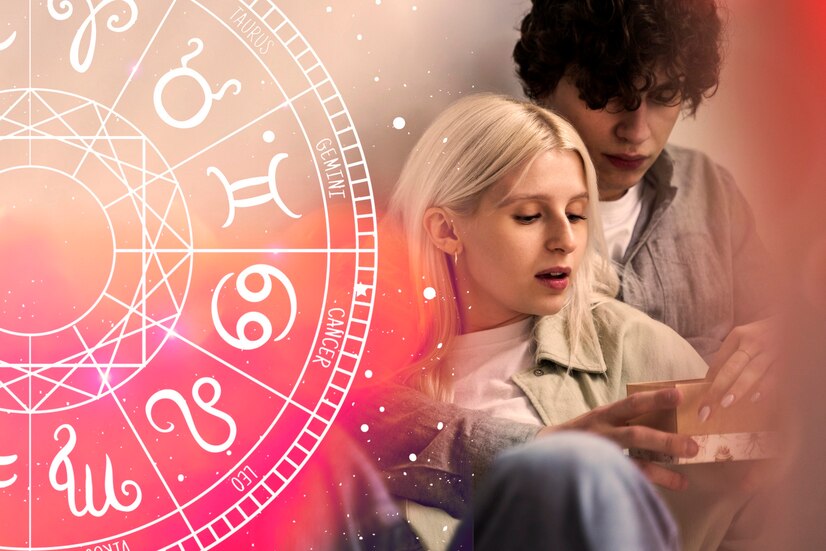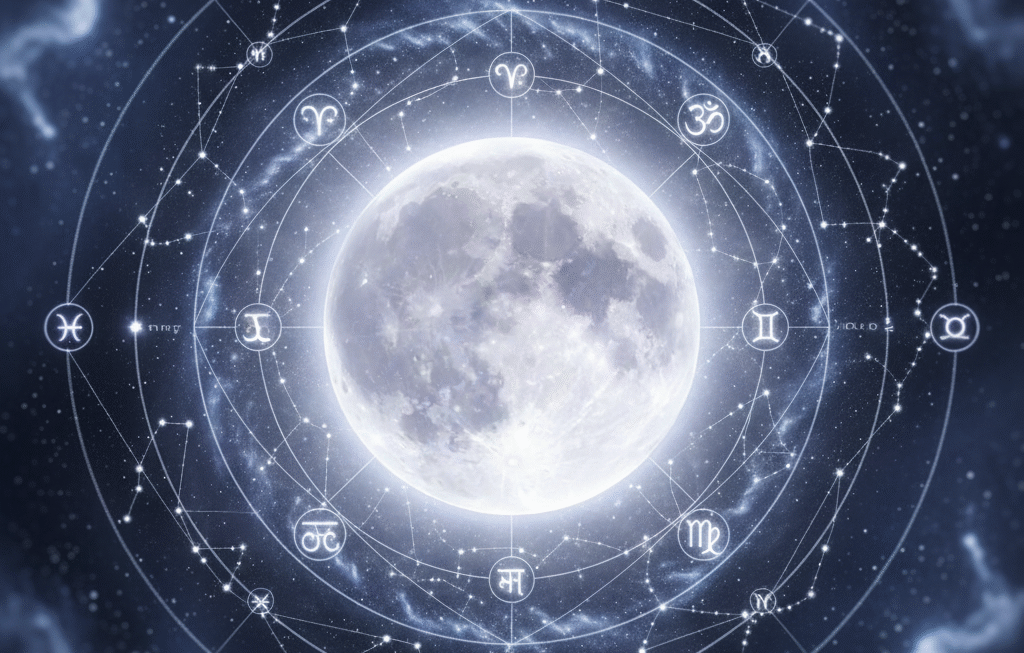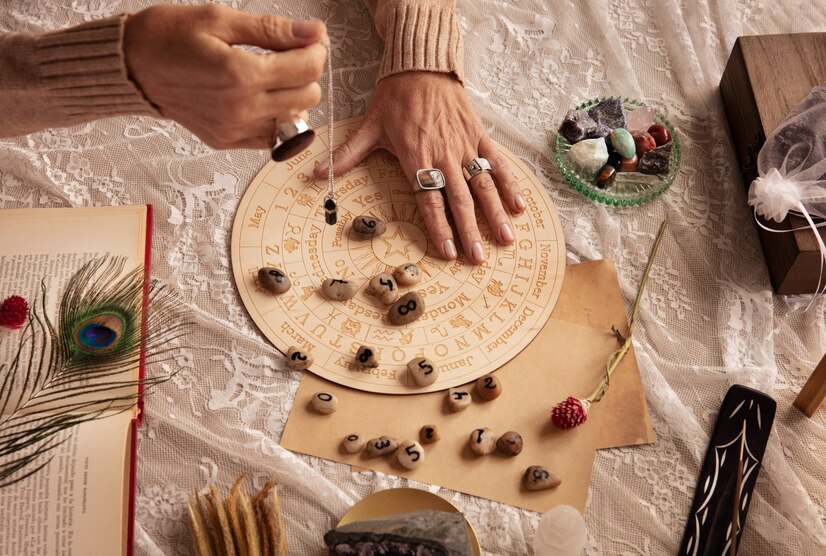Shubhamastu! Welcome to our council, where today we bask in the gentle radiance of Shukra, or Venus, in Jyotish (Vedic Astrology). Known as the Guru of the Asuras and a primary benefic Graha, Shukra governs love, beauty, pleasure, comfort, arts, and relationships. We shall explore the Venus Sign Meaning (Shukra Rashi Meaning) within the Sidereal Zodiac, understanding its role beyond simple romance to encompass Relationship Needs Astrology (Vedic style), Values and Aesthetics Astrology, and the pursuit of harmony (Samatva).
The Participants:
- Guru Shukracharya: A Traditional Jyotishi, embodying the wisdom of Shukra from classical texts.
- Devi Lakshmi: A Contemporary Jyotishi, interpreting Shukra’s grace in modern life and relationships.
- Gandharva Student: A Dedicated Student, learning Shukra’s nuances and artistic connections.
- Ratna Advisor: A Practical Application Expert, advising on relationships, luxury, and remedies using Shukra insights.
- Moderator: Guiding our appreciation of Shukra.

Round 1: Understanding Venus Sign Meaning from Multiple Angles (Vedic Perspective)
Moderator: Let’s begin with the classical wisdom. Guru Shukracharya, what is the essence of Shukra in traditional Jyotish?
Guru Shukracharya: Shukra, the Luminous Guru, is the Karaka (significator) for spouse (Kalatra Karaka, especially for males), love, marriage, sensual pleasures (bhoga), beauty, comforts, luxury, vehicles (vahana), arts (music, dance, poetry), diplomacy, semen, and harmony. Its strength (Bala) and placement in the Kundali by Rashi (Sidereal sign) and Bhava (house) determine one’s capacity for enjoyment, relationship happiness, artistic talent, and acquisition of wealth and comforts. Shukra is one of the key Planetary Rulers Venus (ruling Vrishabha/Taurus & Tula/Libra). A strong Shukra (Uchcha/exalted in Pisces, Swakshetra in Taurus/Libra) bestows charm, refinement, artistic ability, and fulfilling relationships.
Devi Lakshmi: Contemporary Jyotish cherishes these meanings, often framing Shukra as the planet of Values and Aesthetics Astrology. It represents what we find beautiful, what brings us pleasure, and our personal ‘value system’ that guides relationship choices and artistic expression. Its Rashi placement colours our Astrology Love Language (Vedic context) – Shukra in Karka (Cancer) seeks emotional bonding, while Shukra in Kumbha (Aquarius) values intellectual connection and unique expression. It governs our capacity for diplomacy, compromise, and creating harmony in our environment.
Gandharva Student: It’s fascinating how Shukra rules both sensual pleasure and diplomacy! Learning its dignities – exalted (Uchcha) in Meena (Pisces), the sign of Jupiter, and debilitated (Neecha) in Kanya (Virgo), the sign of Budha – is key. How does its relationship with other Grahas, like its enemy Surya (Sun) or friend Shani (Saturn), affect its expression? And how crucial is Shukra compared to the 7th house lord for relationships?
Ratna Advisor: Excellent questions, Gandharva! Practically, Shukra’s condition is vital for Relationship Needs Astrology. While the 7th Bhava/lord shows the structure of partnership, Shukra reveals the quality of love, harmony, and pleasure within it. Its association heavily modifies it – Shukra with Shani might bring seriousness or delay in relationships but also loyalty. Afflictions to Shukra can indicate relationship challenges or issues with finances/comforts, often prompting advice on specific Upayas (remedies) like wearing a diamond (carefully prescribed!) or chanting Shukra mantras. We also assess Shukra for career guidance in arts, design, cosmetics, finance, or advisory roles.
Guru Shukracharya: Indeed. Shukra’s association is critical. Its conjunction with benefics enhances its positive qualities. Conjunction or aspects from malefics can distort its expression, leading to indulgence, relationship issues, or health problems related to its significations. The Bhava Shukra occupies shows where one seeks pleasure and harmony (e.g., Shukra in the 4th Bhava desires beautiful home, happy family life). Malavya Yoga, one of the Pancha Mahapurusha Yogas (formed when Shukra is strong in a Kendra), bestows immense comforts, charm, and success.
Devi Lakshmi: Psychologically, Shukra represents our capacity for connection, empathy, and appreciation of beauty in all forms. A well-placed Shukra suggests emotional refinement and social grace. A challenged Shukra might point to difficulties in forming balanced relationships or finding joy, indicating areas for conscious cultivation of harmony and self-worth (as Shukra also relates to the value we place on ourselves).
Perspective Intersection: The traditional view of Shukra as Karaka for love, pleasure, and arts (Shukracharya) is enriched by the contemporary focus on values and harmony (Lakshmi), which students (Gandharva) learn to assess through dignity/association, enabling practitioners (Ratna) to advise on relationships, career, and remedies.

Round 2: Common Misconceptions vs. Reality (Vedic Context)
Moderator: Let’s address some common misunderstandings about Shukra. Devi Lakshmi?
Devi Lakshmi: A primary misconception is reducing Shukra solely to romance or sex. While it governs these, its domain is much broader: art, beauty, diplomacy, comfort, wealth acquired through pleasant means, and our overall capacity for enjoyment and appreciation. It’s about the quality of interaction and experience. Judging Venus Sign Meaning only by romantic compatibility is too narrow.
Ratna Advisor: Another misconception relates to remedies. Wearing a diamond just because you want more luxury or love, without proper analysis of Shukra’s functional role (benefic or malefic for the specific Lagna) and condition in the Kundali, can be counterproductive or even harmful. Shukra Upayas need expert prescription based on the entire chart. Also, thinking a debilitated Shukra (Neecha in Virgo) prevents marriage or happiness is false; it indicates challenges or specific patterns (perhaps practicality over romance, or issues with criticism in relationships) that need understanding, and Neecha Bhanga Raja Yoga can alter results dramatically.
Guru Shukracharya: Traditionally, sometimes Shukra’s association with pleasure led to it being viewed cautiously, fearing indulgence. However, classical texts also praise a strong Shukra as essential for a comfortable and fulfilling life. It represents divine artistry and the beauty of creation, not just base desires. Underestimating its role in diplomacy and counsel (as Guru of Asuras) is another oversight.
Gandharva Student: I initially thought Shukra and Chandra (Moon) were very similar because both relate to emotions and relationships. But I learned Shukra is more about conscious relating, attraction, values, and pleasure, whereas Chandra is more about innate emotional needs, mind, and security. Differentiating their roles is key for accurate Relationship Needs Astrology.
Hidden Wisdom: Shukra Asta (Combustion): Like Budha, Shukra can become combust (too close to Surya). This significantly diminishes its ability to provide comforts, harmony, and relationship happiness, often indicating compromises or challenges in these areas. However, the exact degrees and context matter greatly.
Round 3: Historical Evolution & Future Directions (Vedic Context)
Moderator: How has Shukra’s understanding evolved? Guru Shukracharya?
Guru Shukracharya: Shukra’s reverence is ancient, depicted in Puranas as a powerful Guru and master of Sanjeevani Vidya (reviving the dead). In Jyotish, its significations as Karaka for key life areas (spouse, vehicles, pleasure) and its rulerships/dignities were established early in foundational texts. Yogas involving Shukra, like Malavya Yoga, were highly esteemed.
Devi Lakshmi: While core meanings persist, contemporary interpretations delve deeper into the psychology of Shukra – its link to self-worth, attachment styles, Values and Aesthetics Astrology, and its role in finding balance and joy in a complex modern world. Its connection to creative arts is explored across diverse modern fields (design, media, fashion).
Ratna Advisor: Practical applications are refined. Relationship compatibility analysis looks beyond simple Koota matching to Shukra’s sign, house, aspects, and condition in both charts. Financial advice considers Shukra’s role in luxury goods, investments related to beauty/arts, and generating income through pleasant means. Guidance on artistic pursuits relies heavily on Shukra’s assessment. Upayas for Shukra are perhaps more commonly discussed now.
Gandharva Student: Access to diverse artistic expressions globally perhaps broadens how we see Shukra’s influence today. Learning resources increasingly highlight its connection to specific art forms based on Rashi or Nakshatra. Visualizing Shukra’s influence through Varga charts (like D9 Navamsa for marriage, D16 Shodashamsa for vehicles/comforts) is becoming easier with software.
Critical Considerations: Equating Shukra solely with materialism misses its connection to refinement, art, and higher harmony. Conversely, ignoring its link to sensual pleasure denies a core aspect of its nature. Balance is key. Also, cultural norms heavily influence relationship expectations, which must be considered alongside Shukra’s placement.
Closing Reflections: Integrating Wisdom for Today’s Seeker
Moderator: How can our audience best integrate these Jyotish perspectives on Shukra?
Ratna Advisor: Identify your Shukra’s Rashi (Sidereal) and Bhava. Understand what brings you genuine pleasure and harmony (Shukra’s domain). Assess its strength to see potential ease or challenges in relationships and comforts. Use this knowledge from your Venus Sign Meaning (Vedic) to make conscious choices in love, finances, and aesthetics, and consider appropriate Upayas if facing significant challenges.
Gandharva Student: Appreciate Shukra’s artistry! Explore creative outlets that resonate with your Shukra placement. Differentiate its role in love (attraction, harmony) from Chandra’s (emotional need) and Guru’s (wisdom in partnership). Notice what you value aesthetically.
Devi Lakshmi: Cultivate harmony in your relationships and environment, guided by your Shukra’s nature. Understand your Astrology Love Language and Relationship Needs Astrology (Vedic style). Practice diplomacy and appreciate beauty. Connect Shukra to self-worth – valuing yourself allows for healthier connections.
Guru Shukracharya: Respect Shukra as a great benefic and Guru. Understand its traditional significations and role as Karaka. Assess its dignity and associations carefully. Honour the pursuit of refined pleasure and artistry as valid life goals. Consider traditional Shukra mantras or practices if appropriate and chart-supported.
Moderator: Thank you, council. Shukra in Jyotish is the divine artist, diplomat, and bestower of pleasure and harmony. Understanding its placement and strength illuminates our path to fulfilling relationships, aesthetic appreciation, comfortable living, and the expression of grace in the world.
Further Learning
- Mangal (Mars) in Jyotish (Shukra’s counterpoint in relationships)
- Chandra (Moon) in Jyotish (Emotional needs vs. Venusian pleasure)
- Bhavas (Houses) in Jyotish (esp. 2nd, 4th, 7th, 12th)
- Malavya Yoga and other Shukra-related Yogas
- Introduction to Nakshatras (for Shukra’s Nakshatra)
- Gemstone Therapy (Upayas) in Vedic Astrology












